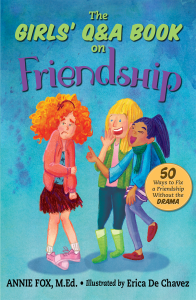|
|
October 29, 2014
I met Beth Engleman (@Momonastring) back in 2002 when we worked together on a project at LeapFrog. Smart woman. Quick to smile. Liked her immediately. Twelve years later she’s rocking it out at MommyOnAShoeString.com.
Last Friday Beth kindly hosted a stop on The Girls’ Q&A Book on Friendship blog tour and challenged me with sticky questions from 4th-7th graders. This one touched my heart:
 Is this really the end? M: I am in 5th grade and my best friend since 1st grade is now hanging out with a new girl who moved to our school this year. They often don’t include me. What should I do to get my BFF back?
Annie: It can be very upsetting when someone you were once so close to now acts like the friendship isn’t important. It can be disappointing and confusing when a friend doesn’t treat you with the care and respect you deserve. It can also hurt when someone “new” shows up and seems to be taking your place in your friend’s heart.
You seem to think that you can do something to get your BFF “back.” Maybe if you had a magic wand and a handy spell you might be able to turn the friendship back to the way it was. That would be cool, but that’s not going to happen. You don’t need me to tell you that there are no such things as wands and spells. Your friend has her own thoughts and feelings and there is nothing you can do to get her to “include” you unless she chooses to do it!
But even without magic, you are not powerless. There are always options for improving a situation, especially for lightening up the heavy way you feel right now. You are hurting. You may also be feeling jealous (of the new girl) and/or lonely. If your goal is to feel better, then you could talk to your friend (privately and calmly… you don’t need an audience or any drama). You might say something like this, “I really miss hanging out with you. I miss the good times we used to have. I feel left out when you and _____ do stuff without me.” That’s the truth and it is often empowering to speak the truth. Saying the words will give your friend something to think about. If the friendship grows stronger, then it was a good thing that you spoke up for yourself. If things between you do not change and the girls continue not including you, then it was still good that you spoke up. Now you know that you deserve to be treated with respect. Take what you’ve learned and be on the look-out for new friends. Good luck!
Check out the rest of Beth’s Q’s and my A’s and the rest of the blog tour.
 50 Ways to Fix a Friendship without the DRAMA

October 27, 2014
 My days as a pumpkin are over. Now I’m just a squash. The Girls’ Q&A Book on Friendship blog tour bus pulled up in front of EncouragePlay.com. On the front porch, beside a carved-too-early Jack-o-lantern, former school counselor, Janine Halloran and I enjoyed fresh pumpkin muffins and apple cider. Then she threw me this tricky question from a former student:
“I have a bad reputation in school for being mean but I’d like to change it. How can I do that?”
Janine: What would you say to that girl?
Annie: It sounds like you now understand how your reputation grew from your not being careful with other people’s feelings. I’m really proud of you for realizing you are responsible for your behavior and that you want to start making better choices. The first step is to apologize to everyone you knowingly hurt with your words and your actions (online and off). Talk to each person separately. (This might take a while and it might not be an easy conversation to have, but you can do it!)
To each person, you might say something like this, “I’m very sorry for what I did to you. It was mean and I want to apologize.” Then close your mouth and listen to what the person says. They may still be angry with you for things you did. (And they may have a right to be angry!) Please try to stay calm and not to get angry back. Just listen to what they have to say. You may learn a lot from what you hear. Even if the person is so surprised by your apology that he or she doesn’t know what to say, that’s OK. You have given them something to think about. You might just leave it at that… Or you might add this: “I’m trying to be a nicer person. I hope you give me a chance to prove it.”
******
What experiences have you had trying to get people to see you in a new way?

October 25, 2014
This question was asked of me on my current Girls’ Q&A Book blog tour, by Deborah McNelis, educator and founder of Brain InSights.
Deborah: Is there an aspect of friendships that you find to be most common from girls?
Annie: Yes! A common thread weaves its way through most girl friendship conflicts and makes girls feel trapped in uncomfortable peer relationships. It’s a misconception many girls have about their role in a friendship– a bizarre assumption that: “If I speak up for myself in a friendship, I am not being a good friend.” This creates huge problems for girls because when they are upset, they need to express themselves effectively and appropriately to their friend. (Talking behind her back doesn’t count as effective communication!)
Because girls are often unwilling and/or unable to initiate those necessary conversations, they feel miserable and complete stuck in their misery. They believe a “good friend” should never tell a friend something negative because then she will hurt the friend’s feelings. And that’s mean. So, if I, Annie, am hurt by something my bff Deborah did, I can not tell her, otherwise I will not be a good friend. But Deborah is not a mind reader. If I stay silent, Deborah has no way of knowing how I feel. My silence will, in fact, send the message that it is OK for her to continue treating me badly, even though it is not OK! My silence also leaves me feeling upset and powerless, not realizing that I do have power to change my response to this situation.
There is no girls’ friendship drama that can’t be made WORSE… through staying silent, venting behind a friend’s back, or pretending things are just peachy. Since we’re here to help girls make things better, one way is to give them opportunities to talk things through with us parents and teachers. Another is to do actual role play with them to boost their confidence in having these honest conversations. And finally, it’s our job to help them realize that they are never without options for feeling better about themselves in any relationship.
Every Friday at #GirlDramaChat we discuss girls’ friendship challenges and smart strategies for teaching them compassion, respect, and social courage. Follow me @GirlDramaChat for updates.
 50 Ways to Fix a Friendship without the DRAMA

October 22, 2014
As some of you know, I’m currently on a blog tour to spread the word about The Girls’ Q&A Book on Friendship: 50 Ways to Fix a Friendship without the DRAMA. If you are female (any age), and/or if you are raising a daughter, teaching or coaching girls or you’ve got a sister, a niece, etc., I’m guessing you know about girls’ friendship DRAMA. Destructive lunacy, right?
 The Girls’ Q&A Book on Friendship empowers girls to make choices they feel good about. For the next several weeks, I’ll be highlighting some of the friendship questions my gracious blog tour hosts tossed in my direction as I stopped at their site. No softballs here!
This question comes from the dynamic educator and psychologist, Louise Masin Sattler ( @LouiseASL )
Louise: Do you think we are making strides in reducing bullying in the schools? And are girls worse than boys with bullying?
Annie: Yes, of course we are making strides. Yippee! Progress should be celebrated. Are those strides being made universally? No. Is the progress happening quickly enough? Hell no! There are still many schools where teachers bully students and where teachers turn a blind eye and a deaf ear to students making sexist, homophobic, and racially-charged comments to other students. There are still school administrators who shrug and tell distraught parents of targeted students, “Kids will be kids.” or “Teen girls are just mean. What are you going to do about it?” (Actual statements made by school administrators as reported to me by extremely frustrated parents.)
Are girls “worse” than boys with bullying? I don’t believe so. Both girls and boys are afflicted by Peer Approval Addiction in equal measure. Both genders struggle to do the right thing while simultaneously feeling compelled to do whatever it takes to fit in… including stuff they aren’t particularly proud of. The difference, if it exists at all, may be in the methodology girls and boys use to “take down” peers, online and off. That said, the seeds of compassion and empathy are equally prevalent in boys and girls. So, even though I wrote this book for girls, both boys and girls need to understand that their choices matter… in peer relationships and in life.
Read more of Louise’s Q’s and my A’s at LouiseSattler.me

| |














